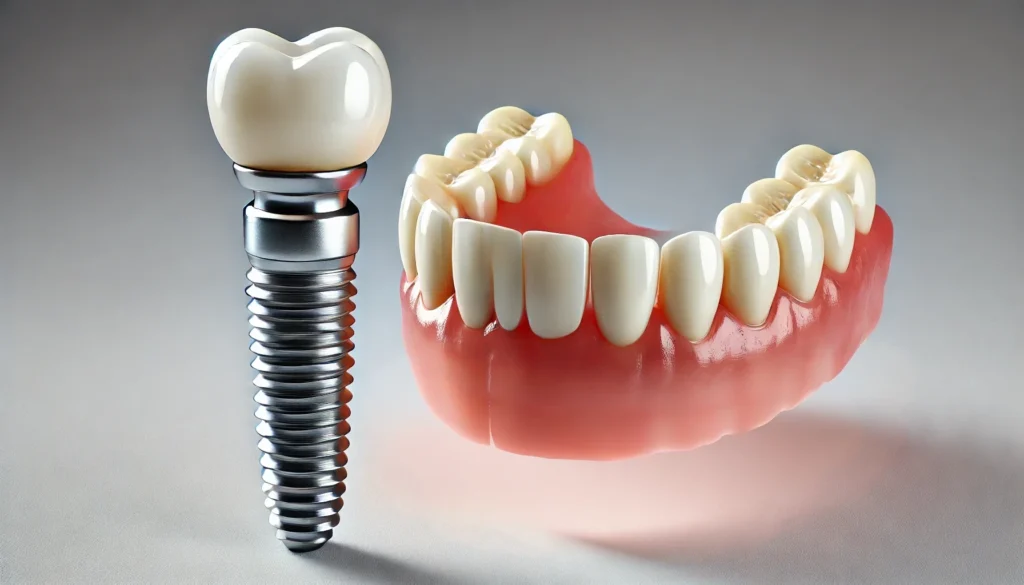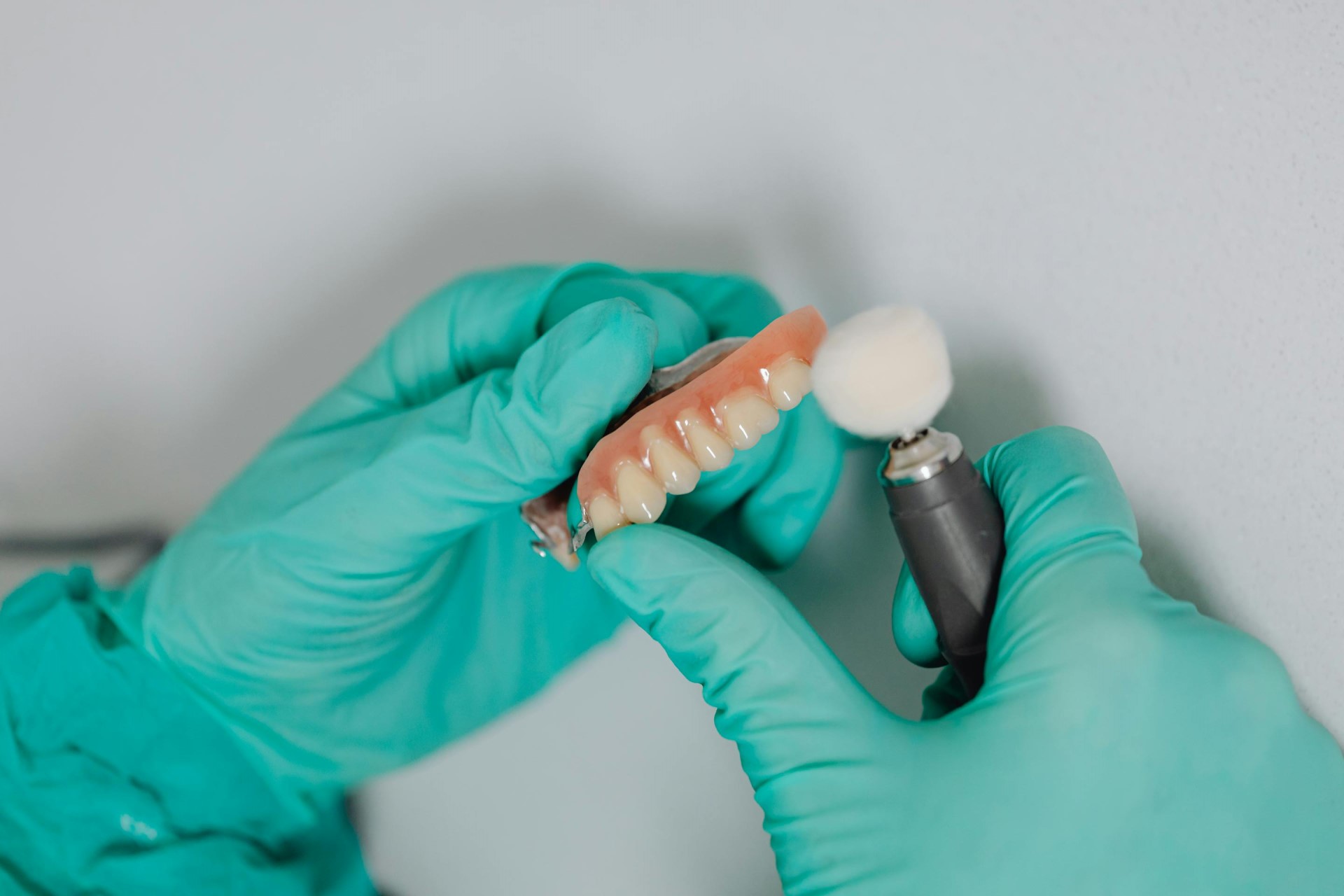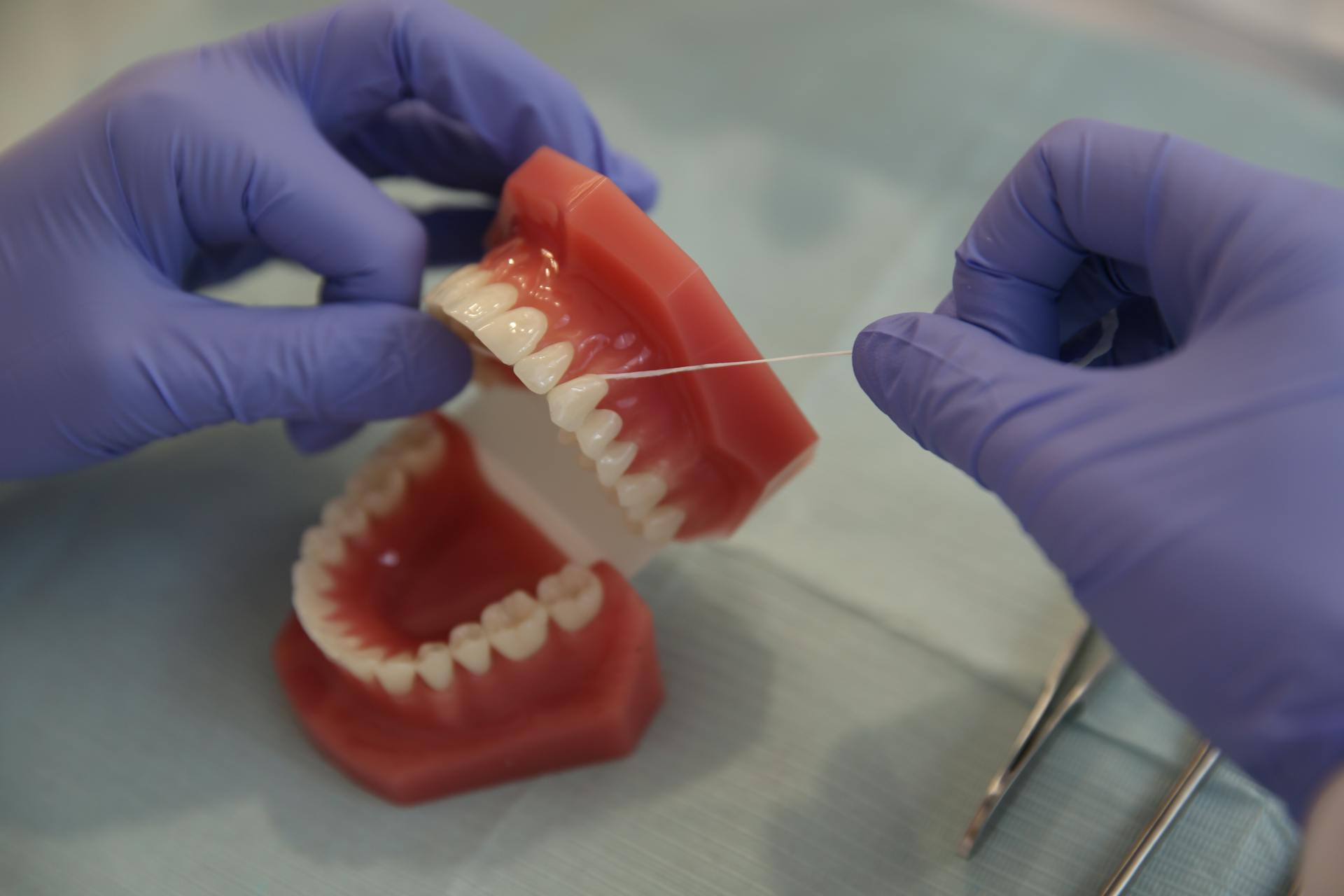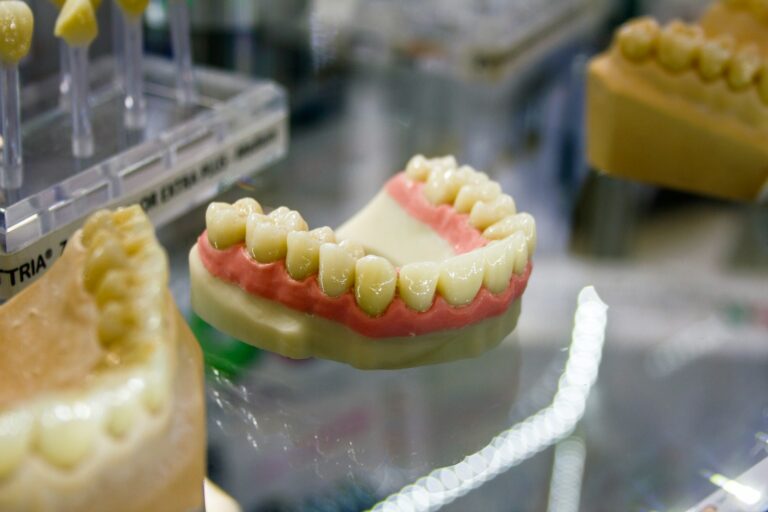
When considering the restoration of your smile, the decision between dental implants and dentures can indeed be quite daunting. Each option presents its own materials, procedures, costs, and benefits, making it essential to fully understand both choices.
This article aims to clarify the differences and similarities of dental implants vs dentures, while also exploring the advantages of each. By doing so, it assists you in determining which solution is best suited to your needs.
Furthermore, it includes valuable tips on how to care for your chosen option, ensuring that you achieve long-lasting results.
What Are the Differences Between Dental Implants and Dentures?

In terms of tooth replacement options, many individuals find themselves weighing the merits of dental implants versus dentures, each of which has its own set of advantages and challenges for oral health.
Dental implants are often viewed as a more permanent solution; they involve the insertion of a titanium post into the jawbone, which provides stability and mimics the natural appearance of real teeth.
On the other hand, dentures are removable prosthetics that can effectively restore both functionality and aesthetics, although they may require adjustments over time.
Ultimately, the choice between these options hinges on various factors, including bone density, personal preferences, and the impact on one’s lifestyle. Therefore, it is essential to understand the fundamental differences between them.
What Are the Materials Used for Dental Implants and Dentures?
The materials selected for dental implants and dentures are vital in ensuring durability, functionality, and comfort for individuals seeking tooth replacement options.
These materials not only affect the longevity and performance of the prosthetics but also significantly influence the overall satisfaction experienced by the patient.
For example, dental implants benefit from the biocompatibility of titanium, which allows for a secure bond with the jawbone. This connection is essential for stability and plays a crucial role in preserving facial structure.
On the other hand, the lightweight properties of acrylic resin used in dentures provide a comfortable fit while mimicking the translucency of natural teeth, thereby enhancing aesthetics.
Both solutions highlight the importance of choosing high-quality materials, as this decision directly affects comfort levels and visual appeal, ultimately boosting the user’s confidence and quality of life.
What Is the Procedure for Getting Dental Implants and Dentures?
Understanding the procedures for obtaining dental implants and dentures is crucial for patients considering these tooth replacement options, as each involves distinct steps, recovery times, and levels of invasiveness.
The dental implant process typically encompasses a surgical procedure in which the implant is placed into the jawbone, followed by a healing or recovery phase that may last several months. In contrast, acquiring dentures usually requires a series of dental visits for impressions and fittings, making it a non-invasive choice that allows for quicker adjustments and personalization.
Patients should recognise that both treatment options necessitate thorough consultations with a dentist, who will evaluate their oral health and provide tailored recommendations based on individual needs.
For dental implants, the surgical techniques may vary, including methods such as flapless or guided implant surgery, which can influence both recovery times and patient comfort.
On the other hand, those choosing dentures can anticipate multiple appointments for fitting adjustments and may benefit from temporary solutions while their gums heal.
By understanding the potential postoperative discomfort and emphasising the significance of follow-up care, patients can be well-prepared for their journeys towards restored smiles, gaining insights into both long-term maintenance and ongoing dental health.
What Is the Cost of Dental Implants and Dentures?
When considering tooth replacement options, it is essential to understand the costs associated with dental implants and dentures, as these can vary significantly in both price and value over time.
Dental implants typically have a higher initial cost due to the surgical procedure involved and the use of materials such as titanium. However, they often provide greater longevity and stability in the long run.
In contrast, dentures usually come with lower upfront costs, making them a more budget-friendly option. However, they may require more frequent replacements and adjustments, which can impact overall expenses.
To fully appreciate the financial implications, it is important to take insurance coverage into account, as it may help mitigate costs for each option. Many insurance plans offer limited reimbursement for dentures, making them more accessible in the short term. On the other hand, coverage for dental implants is often minimal, which can result in accumulating out-of-pocket expenses over time.
While dentures might appear more affordable at first glance, the ongoing need for care and replacements can lead to significant costs that outweigh the initial savings. A comprehensive analysis suggests that, although the upfront investment in implants is considerable, their durability may ultimately provide a better value proposition for individuals seeking a long-term solution.
What Are the Benefits of Dental Implants?

Dental implants present a variety of benefits that make them an attractive option for those in search of effective tooth replacement solutions.
One of the most notable advantages is their natural appearance and feel, which closely resembles real teeth. This similarity can significantly boost self-esteem and improve overall quality of life.
Furthermore, dental implants are known for their long-lasting durability, especially when coupled with proper care and maintenance. They also play a crucial role in preventing bone loss by stimulating the jawbone, thereby ensuring both functionality and aesthetics over the long term.
1. More Natural Look and Feel
One of the notable advantages of dental implants is their capacity to provide a more natural appearance and feel when compared to traditional dentures or other tooth replacement methods. This benefit primarily stems from the titanium post being securely anchored into the jawbone, creating a stable foundation that mimics the functionality of natural teeth.
Consequently, patients often report a boost in self-esteem and comfort, knowing that their smile appears as natural as possible.
The design of dental implants ensures that they integrate seamlessly with the surrounding teeth, resulting in a smile that is both aesthetically pleasing and functional. Patients generally find that these implants offer exceptional comfort during daily activities, such as enjoying their favourite foods without concern and speaking clearly without any impediments.
This level of confidence not only enhances oral health by promoting proper chewing and digestion but also significantly contributes to overall patient satisfaction. With a renewed sense of normalcy, individuals are able to engage more fully in social situations, ultimately enhancing their quality of life.
2. Long-lasting Solution
Dental implants are recognised for their impressive longevity, often lasting many years with proper care. This makes them a worthwhile investment for individuals seeking a reliable solution for tooth replacement.
Unlike dentures, which may require frequent repairs or replacements, implants offer a durable option that can handle everyday use while maintaining their functionality over time. This long-lasting nature not only saves patients money in the long run but also minimises the stress and inconvenience linked to frequent dental visits.
To keep dental implants in optimal condition, it is essential to maintain regular oral hygiene practices, including brushing and flossing. Additionally, routine dental check-ups are crucial, as they enable professionals to monitor the health of the gums and surrounding bone.
Investing in dental implants can often be more cost-effective over time. While the initial expense may be higher, it is often offset by the absence of ongoing costs associated with dental adhesives, fittings, or denture replacements. Although the upfront cost of implants might seem significant, their durability and lower maintenance requirements present a notable financial advantage when compared to the continually rising costs related to traditional denture care, making implants a wise choice for many individuals.
3. Prevents Bone Loss
One of the significant benefits of dental implants is their ability to prevent bone loss, which is a common issue that arises when teeth are missing. The titanium posts used in implants stimulate the jawbone, helping to maintain bone density and stability—both of which are essential for overall oral health.
By preserving the condition of the jawbone, dental implants help to prevent complications such as bite alignment issues and additional tooth loss.
This preservation is crucial not only for functional aspects like chewing and speaking but also for aesthetic reasons, as a healthy jawline plays an important role in one’s facial structure. When the bone surrounding the teeth is adequately supported, patients typically experience improved outcomes, including greater comfort and enhanced confidence.
Maintaining bone density through implants can significantly reduce the risk of developing serious conditions associated with tooth loss, thereby leading to a more favourable long-term prognosis for oral health.
Investing in dental implants is advantageous for both immediate stability and future oral wellness, highlighting the interconnectedness of dental solutions and overall health.
4. No Dietary Restrictions
One significant advantage of dental implants is that they eliminate the dietary restrictions commonly associated with traditional dentures. Patients with implants can savour a wide variety of foods without worrying about discomfort or instability, as these implants function much like natural teeth.
This ability to chew comfortably and with confidence significantly enhances overall functionality and quality of life, enabling individuals to maintain a healthy and diverse diet.
Incorporating a range of foods not only supports better nutritional intake but also positively impacts social interactions, as meals often play a crucial role in bonding experiences. For those who have regained their chewing function through implants, communal dining transforms into a delightful occasion rather than a source of anxiety.
The comfort that dental implants provide encourages individuals to chew their food thoroughly, which can lead to improved digestion and better overall oral health.
The security offered by implants grants a level of freedom that is essential for fully enjoying life’s pleasures, from gourmet meals to casual snacks. This underscores the vital connection between oral health and an enriched lifestyle.
What Are the Benefits of Dentures?

Dentures offer numerous benefits that make them an appealing choice for individuals in need of tooth replacement, particularly for those seeking a cost-effective solution.
The process of obtaining dentures is generally non-invasive and involves less surgical intervention compared to dental implants, making them a suitable option for patients who may not be ideal candidates for surgical procedures.
Furthermore, dentures can also function as a temporary solution while individuals explore more permanent options, allowing for the immediate restoration of both function and aesthetics.
1. Affordable Option
One of the key benefits of dentures is their affordability compared to other tooth replacement options, such as dental implants. For many patients, dentures serve as a budget-friendly solution that effectively restores both function and aesthetics without the high costs associated with surgical procedures.
Additionally, many insurance plans may cover some of the expenses related to dentures, making them accessible to a broader range of individuals.
When analysing the overall costs, dentures typically require a lower initial investment, allowing patients to manage their dental care within their financial limits. Patients can also explore different types of dentures, such as partial or full sets, which can better meet their specific needs and budgets.
Moreover, various dental clinics provide financing plans or payment options, which can alleviate the burden of immediate costs. Collectively, these factors highlight that, with appropriate planning and resources, individuals from diverse income levels can discover viable denture solutions that fit their financial circumstances.
2. Non-Invasive Procedure
The non-invasive nature of obtaining dentures makes them an appealing choice for many patients, particularly those who may feel anxious about surgical procedures. Unlike dental implants, which necessitate surgery and a recovery period, dentures can typically be fitted and adjusted during regular dental appointments. This allows for a quicker and less stressful experience, which is especially advantageous for individuals seeking a more straightforward approach to tooth replacement.
Patients can rest assured that they will not have to navigate the complexities and potential discomfort associated with surgical interventions. The fitting process is generally uncomplicated and can often be conducted in a comfortable office environment, making it both accessible and aligned with a patient’s preference for a hassle-free solution to dental issues.
Additionally, the opportunity to trial different fittings enables personalised adjustments, ensuring that patients leave the office feeling satisfied and confident with their new smile. This emphasis on comfort and patient preferences undoubtedly contributes to the growing popularity of dentures.
3. Easy to Repair and Replace
Dentures are recognised for their ease of repair and replacement, which makes them a practical choice for individuals who may encounter wear and tear over time. Unlike dental implants, which often necessitate invasive procedures for adjustments or replacements, dentures can typically be repaired or replaced quickly and at a lower cost.
This ensures that patients can maintain their smile with minimal inconvenience, an aspect that can be particularly reassuring for those who value maintenance and long-term usability.
The ability to easily seek assistance from patient support groups further enhances the appeal of choosing dentures. These groups often offer valuable guidance on proper care and maintenance, which can help prolong the life of the dentures and simplify repairs.
With affordable options readily available, individuals can avoid significant financial burdens while enjoying the convenience of quick fixes. This allows them to focus more on their daily lives rather than being preoccupied with ongoing dental issues.
Ultimately, the combination of practical repair solutions and access to community resources makes dentures a wise and efficient choice for many individuals.
4. Can Be Used as a Temporary Solution
Dentures can serve as an excellent temporary solution for individuals transitioning from tooth loss to more permanent options, such as dental implants. During the healing phase or while making decisions about long-term treatment, dentures can immediately restore both functionality and aesthetics. This allows patients to regain confidence in their smiles and oral health.
The flexibility of dentures makes them a practical choice for those who need time to consult with their dentist regarding their long-term options.
While individuals may still be weighing their choices, dentures provide important benefits such as improved speech and the ability to enjoy a wider variety of foods, which can be challenging without teeth. This temporary measure significantly enhances lifestyle, enabling patients to socialise and eat more comfortably.
As they navigate this period, patients appreciate the convenience of removable dentures, which can simplify daily care and maintenance. This approach not only allows for personal adjustment but also provides the time needed to consider the most suitable permanent solutions tailored to their unique dental needs.
Which Option Is Right for You?

When choosing between dental implants and dentures, it is important to consider several factors thoughtfully, such as budget, oral health, and personal preferences.
Each option comes with its own set of advantages and disadvantages, so individuals should carefully evaluate their unique needs and circumstances. The condition of the jawbone, any existing dental issues, and overall lifestyle factors can all significantly influence which tooth replacement solution is the most suitable choice.
1. Consider Your Budget
When considering the choice between dental implants and dentures, one of the primary factors to weigh is the budget, as the costs associated with these tooth replacement options can differ quite significantly.
While dental implants generally require a higher upfront investment, they often provide greater long-term value due to their durability and longevity. On the other hand, dentures may have a lower initial cost, but it is important for patients to consider potential ongoing expenses related to repairs or replacements.
To effectively analyse the costs of both options, it is essential to look beyond just the initial expenses and assess the overall financial picture over time. Additionally, understanding insurance coverage is crucial, as many insurance plans may cover a portion of denture costs but not necessarily those for implants.
Patients should also think about the possibility of needing follow-up appointments or adjustments with dentures, as these can add to the overall financial commitment.
By taking all these factors into account, individuals can make more informed decisions that align with both their budget and long-term financial planning strategies.
2. Evaluate Your Oral Health
Evaluating your oral health is essential in determining whether dental implants or dentures are the best options for you. The condition of your jawbone and gums plays a significant role in this decision.
A clinical evaluation by a dental specialist can uncover any underlying issues, such as bone loss or concerns with gum health, which may influence whether dental implants are suitable or if dentures might be a more appropriate alternative.
This assessment also provides a comprehensive understanding of your health history, revealing other factors that could affect the outcomes of your treatment. Certain medical conditions or lifestyle choices can impact healing and the success rates of implants.
By taking this thorough approach, you can create a personalised treatment plan that aligns with your unique oral and overall health profile. Considering these critical evaluations allows you to make informed decisions about your dental care, prioritising both functionality and long-term satisfaction.
3. Discuss with Your Dentist
Engaging in a comprehensive discussion with your dentist is a crucial step in making the decision between dental implants and dentures. Dentists can offer personalised insights and recommendations tailored to your specific needs.
During the consultation, they will explain the potential risks and benefits associated with each option, helping you determine which solution best aligns with your oral health goals and lifestyle.
This open dialogue not only builds trust but also give the power tos patients to take an active role in their dental care journey. By encouraging questions and discussing treatment options in detail, dental professionals can help alleviate any anxieties that may arise regarding procedures.
When patients are well-informed about the alternatives available to them, they feel more confident in making decisions that significantly impact their overall well-being.
Understanding the various aspects of dental care can lead to better outcomes, ensuring that patients feel comfortable and supported throughout the entire process.
How to Care for Dental Implants and Dentures?

Caring for dental implants and dentures is essential for ensuring their longevity and functionality. Proper oral hygiene and regular maintenance play a significant role in overall oral health.
For dental implants, it is crucial to engage in daily brushing and flossing. On the other hand, dentures require specific cleaning routines and necessitate periodic check-ups with a dentist to ensure a proper fit.
By understanding the appropriate care practices for each option, patients can maximise their investment and maintain a healthy smile.
1. Proper Oral Hygiene
Maintaining proper oral hygiene is crucial for the longevity and functionality of both dental implants and dentures, as well as for overall oral health. For those with dental implants, it is important to establish a regular cleaning routine that includes daily brushing and flossing to prevent plaque build-up and address any gum health issues.
On the other hand, individuals who wear dentures should remove them each night for cleaning and soak them in an appropriate solution to maintain their shape and prevent discomfort.
For those with dental implants, using non-abrasive toothpaste and a soft-bristled toothbrush is essential. This approach effectively cleans around the gum line without causing irritation. Regular dental check-ups are also vital; they help monitor the health of the implants and ensure that any early signs of complications are addressed promptly.
Similarly, denture wearers should not only clean their dentures daily but also rinse their mouths with water to keep the soft tissues healthy. By following these tailored maintenance practices, individuals can promote better oral health, enhance their comfort, and extend the lifespan of their dental solutions.
2. Regular Dental Check-ups
Regular dental check-ups are essential for both dental implants and dentures, as they provide an opportunity for timely evaluations of oral health and any necessary adjustments.
For patients with dental implants, these visits allow dentists to monitor the condition of the implant and the surrounding gum tissues. On the other hand, those who wear dentures can benefit from professional assessments to ensure that their dentures fit properly and function effectively. By consistently attending follow-up appointments, patients can prevent complications and improve their overall satisfaction.
These check-ups are crucial for addressing any concerns that may arise, such as discomfort or changes in oral health that could adversely affect the longevity of dental replacements.
Engaging in preventive care through regular visits not only enhances oral hygiene but also offers invaluable support to patients, helping them feel confident in their dental decisions.
Recognising the significance of these appointments encourages patients to take an active role in their oral health journey, leading to a happier, healthier smile that endures over time.
3. Avoiding Damaging Habits
Avoiding harmful habits is crucial for the long-term success of dental implants and dentures, as certain behaviours can jeopardise their functionality and overall oral health. For example, habits such as grinding teeth, chewing on hard objects, or neglecting oral hygiene can create complications for dental implants. Additionally, those who wear dentures should steer clear of sticky or hard foods that might dislodge their prosthetics. Preventive care is essential to ensure that both options remain effective and comfortable.
Failing to attend regular dental check-ups can worsen potential issues, as underlying problems may go unnoticed until they become more serious. Smoking is another detrimental habit that can significantly hinder healing and raise the risk of infection, especially for individuals with implants. Similarly, excessive alcohol consumption can lead to dry mouth, diminishing the natural protective effects of saliva against bacteria.
It is vital to maintain mindful habits, such as proper brushing, flossing, and consuming a balanced diet rich in vitamins and minerals. By being aware of these damaging behaviours, individuals can greatly improve their oral health and extend the lifespan of their dental solutions.
Frequently Asked Questions on Dental Implants vs Dentures
What are dental implants and dentures?
Dental implants are artificial tooth roots that are placed into the jawbone to support a replacement tooth or bridge. Dentures, on the other hand, are removable prosthetic teeth that can replace missing teeth and surrounding tissue.
What are the main differences between dental implants and dentures?
The main difference between dental implants and dentures is that implants are permanently fixed in the jawbone, while dentures are removable. Implants also offer a more natural look and feel compared to dentures and do not require any adhesive for stability.
Which option is better for me, dental implants or dentures?
The best option for you depends on your specific needs and oral health. Dental implants are a great choice for those who have healthy gums and enough jawbone to support the implant. Dentures, on the other hand, are suitable for individuals who have lost most or all of their teeth.
How long do dental implants and dentures last?
Dental implants have the potential to last a lifetime with proper care and maintenance. Dentures, on the other hand, typically need to be replaced every 5-7 years. However, both options can last longer with good oral hygiene habits and regular dental check-ups.
What is the cost difference between dental implants and dentures?
Dental implants tend to be more expensive upfront compared to dentures. However, over time, dentures may require more maintenance and replacements, making them more costly in the long run. It’s best to consult with your dentist to determine the most cost-effective option for your individual situation.
Can I get dental implants if I already have dentures?
Yes, it is possible to get dental implants even if you currently have dentures. In some cases, implants can be placed to support an existing denture, providing a more stable and comfortable fit. It’s best to consult with your dentist to discuss your options and determine the best choice for you.






